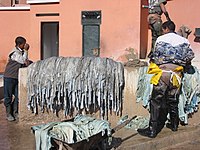
Photo from wikipedia
In leather manufacturing, microwave usually has the ability to strengthen the combination between collagen and chemicals and make the corresponding procedures faster and more effective. Although some studies clarified that… Click to show full abstract
In leather manufacturing, microwave usually has the ability to strengthen the combination between collagen and chemicals and make the corresponding procedures faster and more effective. Although some studies clarified that tanning under microwave resulted in leather with better thermal stability, the process and leather properties of the pelt chrome tanning had not been elaborated in detail. Thus, in this study, pickled goat pelt was tanned for 5 h as a penetration procedure and then basified for another 5 h as a fixation procedure under microwave heating (MW) and water bath heating (WB); then, the changes in the pH of the chromium complexes as well as the leather chrome content were measured; finally, thermal behaviors and collagen structure of leather tanned under different methods were measured. The results indicated that microwave promoted chrome tanning agent penetration and exhaustion, consequently, chrome tanning process was faster and more effective. The leather tanned with microwave assistance had better hydrothermal and thermal stability as well as thermal decomposition resistance, indicating microwave leading to excellent tanning effect. Nevertheless, when microwave was applied in the chrome tanning process, the hierarchical structure of the leather and the collagen conformation including triple helix was not affected, and the combination pattern between ligands and chromium was also the same as that of the conventional. In brief, microwave could fasten the chrome tanning process and result in extraordinary tanning effect without damaging the leather structure; therefore, microwave might be a new method for promoting tanning efficiency and effect in future.
Journal Title: RSC Advances
Year Published: 2020
Link to full text (if available)
Share on Social Media: Sign Up to like & get
recommendations!